Do you mind if I sit here down by your grave side?
A rest for awhile in the warm summer sun,
I've been walking all day and I'm nearly done.
And I see by your gravestone that you were only 19,
When you joined the glorious fallen in 1916.
Well, I hope you died quick and I hope you died clean
Or, William McBride, was it slow and obscene?
did they sound the pipes lowly?
Did the rifles fire o'er ye as they lowered you down?
Did the bugle sing 'The Last Post' in chorus?
Did the pipes play 'The Flowers o' the Forest'?
And did you leave a wife or a sweetheart behind?
In some faithful heart is your memory enshrined?
And though you died back in 1916
To that loyal heart are you always 19.
Or are you just a stranger without even a name,
Forever enclosed behind some glass-pane
In an old photograph torn and tattered and stained
And fading to yellow in a brown leather frame?
did they sound the pipes lowly?
Did the rifles fire o'er ye as they lowered you down?
Did the bugle sing 'The Last Post' in chorus?
Did the pipes play 'The Flowers o' the Forest'?
Well, the sun it shines down on these green fields of France,
The warm wind blows gently and the red poppies dance.
The trenches are vanished now under the plough
No gas, no barbed wire, no guns firing now.
But here in this graveyard it is still No Man's Land
And the countless white crosses in mute witness stand.
To man's blind indifference to his fellow man
And a whole generation that was butchered and downed.
did they sound the pipes lowly?
Did the rifles fire o'er ye as they lowered you down?
Did the bugle sing 'The Last Post' in chorus?
Did the pipes play 'The Flowers o' the Forest'?
And I can't help but wonder now, Willie McBride,
Do all those who lie here know why they died?
Did you really believe them when they told you the cause?
Did you really believe them that this war would end war?
But the suffering, the sorrow, the glory, the shame,
The killing, the dying - it was all done in vain.
For Willie McBride, it's all happened again
And again, and again, and again, and again.
did they sound the pipe lowly?
Did the rifles fire o'er ye as they lowered you down?
Did the bugle sing 'The Last Post' in chorus?
Did the pipes play 'The Flowers o' the Forest'?
Riccardo Venturi, 2003
Versione italiana di Riccardo Venturi (2003)
Italian version by Riccardo Venturi (2003)
Version italienne de Riccardo Venturi (2003)
Riccardo Venturin italiankielinen versio (2003)
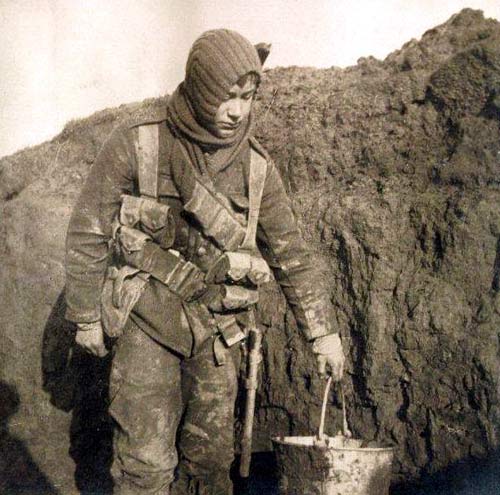
This version, one of the very first of the entire AWS Collection (2003), has been implemented with necessary emendations, as the lyrics were not complete. Special thanks to Tom Joad (well, not exactly that of Woody Guthrie's song whose ghost is echoed in a song by Bruce Springsteen...), who prevented me from an awful translation mistake in the refrain. (RV)
Terra di Nessuno
Come stai, soldato semplice William MacBride?
Ti dà fastidio se mi siedo un po' qui tra le vostre tombe
E mi riposo un po' nel caldo sole d'estate?
Ho camminato tutto il giorno e sono stanco morto.
Vedo dalla tua lapide che avevi solo diciannove anni
Quando hai raggiunto gli eroi caduti nel 1916.
Beh, spero che tu sia morto rapidamente e perbene
Oppure, Willie MacBride, è stata una morte lenta e tremenda?
Suonavano piano le cornamuse?
I fucili sparavano mentre ti calavano nella fossa?
I corni cantavano "The Last Post" in coro?
Le cornamuse suonavano "The Flowers o' the Forest"?
Hai lasciato una moglie o una fidanzata a aspettarti,
E in qualche cuore fedele sei custodito per sempre?
E anche se la tua morte risale al 1916
Per qualche cuore fedele hai per sempre diciannove anni?
Oppure sei solo uno straniero senza neanche un nome,
Per sempre racchiuso dietro a qualche lastra di vetro
In una vecchia foto strappata, spiegazzata e macchiata
Che sta ingiallendo in una cornice di pelle marrone?
Suonavano piano le cornamuse?
I fucili sparavano mentre ti calavano nella fossa?
I corni cantavano "The Last Post" in coro?
Le cornamuse suonavano "The Flowers o' the Forest"?
Il sole splende adesso su questi verdi campi di Francia,
Un vento caldo soffia piano e danzano i papaveri rossi.
I solchi delle trincee sono scomparsi sotto l'aratro,
Adesso niente più gas, né filo spinato, né fucili.
Ma qui in questo cimitero è sempre Terra di Nessuno,
Le infinite croci bianche stanno a muta testimonianza
Della cieca indifferenza umana verso il prossimo,
Per un'intera generazione massacrata e abbattuta.
Suonavano piano le cornamuse?
I fucili sparavano mentre ti calavano nella fossa?
I corni cantavano "The Last Post" in coro?
Le cornamuse suonavano "The Flowers o' the Forest"?
E non posso fare a meno di chiedermi ora, Willie MacBride,
Tutti quelli che giacciono qui sanno perché sono morti?
Ci hai creduto davvero quando ti hanno detto perché?
Hai creduto davvero che quella sarebbe stata l'ultima guerra?
E la sofferenza, la pena, la gloria e la vergogna,
Uccidere e morire - tutto è stato invano.
Perché, Willie MacBride, tutto quanto è successo di nuovo,
Di nuovo, di nuovo, di nuovo, di nuovo.
Suonavano piano le cornamuse?
I fucili sparavano mentre ti calavano nella fossa?
I corni cantavano "The Last Post" in coro?
Le cornamuse suonavano "The Flowers o' the Forest"?
Andrea Buriani, 2015
Traducanzone in italiano di Andrea Buriani (2015)
Italian "Translasong" by Andrea Buriani (2015)
"Traduchanson" italienne: Andrea Buriani (2015)
Italiankielinen käännöksenlaulu: Andrea Buriani (2015)
I verdi campi di Francia
Ciao, come stai, soldato McBride?
Se sulla tua tomba ora siedo, capirai.
E’ solo un riposo nel caldo d'estate
Son stanco-morto, voi tutti scusate.
La lapide dice : diciannove son compiuti
E in quel giorno hai raggiunto gli altri caduti.
Beh, spero sia stata una morte veloce,
O invece, McBride, la tua fine fu atroce?
Suonavano mentre ti calavano giù?
E ora, dimmi, suonava la Banda ed il Coro
Intonava una antica nenia per te?
Hai lasciato una moglie, un amore che ti aspetta?
Sei nel cuore di qualcuno, custodito in cassetta?
Anche se la tua morte al ‘16 risale,
Per loro i tuoi anni son sempre diciannove?
Oppure sei una foto in patria straniero
Senza nome, dietro a un vetro, per sempre prigioniero.
Una foto ingiallita, sbiadita e strappata
In una cornice di pelle macchiata?
Suonavano mentre ti calavano giù?
E ora dimmi suonava la Banda ed il Coro
Intonava una antica nenia per te?
Il sole ora splende sui campi di Francia,
Dove il vento invita i papaveri alla danza.
Non ci son più trincee, ogni campo è arato,
Non più gas, né fucili, nessun filo spinato.
Di tutti e nessuno, vedi i campi in distanza,
Coperti di croci, muta testimonianza
Di disinteresse per quel genere umano,
Generazione nata e morta invano.
Suonavano mentre ti calavano giù?
E ora dimmi suonava la Banda ed il Coro
Intonava una antica nenia per te?
Solo una domanda, Mc Bride, voglio porti:
Quelli che or son qui san perché sono morti?
Han creduto davvero alla promessa giurata
Che l’ultima guerra sarebbe poi stata?
Poi alla fine il dolore, la gloria - han capito -
Uccider, morire: tutto inutile è stato.
Perché, Willie McBride, è successo ancora,
Poi ancora e ancora , e succede tuttora.
Suonavano mentre ti calavano giù?
E ora dimmi suonava la Banda ed il Coro
Intonava una antica nenia per te?
Suonavan temburi e le cornamuse
Piangevano mentre ti calavano giù?
E ora dimmi suonava la Banda ed il Coro
Intonava una antica nenia per te?
inviata da dq82 - 16/11/2015 - 10:10
Hannes Wader, 1980
A free German version by Hannes Wader, available at this page (1980)

(The Green Fields Of France)
Weit in der Champagne im Mittsommergrün,
Dort wo zwischen Grabkreuzen Mohnblumen blüh'n,
Da flüstern die Gräser und wiegen sich leicht,
Im Wind, der sanft über das Gräberfeld streicht.
Auf Deinem Kreuz finde ich toter Soldat,
Deinen Namen nicht, nur Ziffern und jemand hat
Die Zahl Neunzehnhundertundsechzehn gemalt
Und Du warst nicht einmal neunzehn Jahre alt.
So wie sie es mit uns heute immer noch tun,
und Du hast ihnen alles gegeben:
Deine Kraft, Deine Jugend, Dein Leben.
Hast du, toter Soldat, mal ein Mädchen geliebt?
Sicher nicht, denn nur dort, wo es Frieden gibt,
Können Zärtlichkeit und Vertrauen gedeihn,
Warst Soldat, um zu sterben, nicht um jung zu sein.
Vielleicht dachtest du dir, ich falle schon bald,
Nehme mir mein Vergnügen, wie es kommt, mit Gewalt.
Dazu warst du entschlossen, hast dich aber dann
Vor dir selber geschämt und es doch nie getan.
So wie sie es mit uns heute immer noch tun,
und Du hast ihnen alles gegeben:
Deine Kraft, Deine Jugend, Dein Leben.
Soldat, gingst du gläubig und gern in den Tod?
Oder hast du verzweifelt, verbittert, verroht,
Deinen wirklichen Feind nicht erkannt bis zum Schluß?
Ich hoffe, es traf dich ein sauberer Schuß.
Oder hat ein Geschoß dir die Glieder zerfetzt,
Hast du nach deiner Mutter geschrien bis zuletzt,
Bist auf deinen Beinstümpfen weitergerannt,
Und Dein Grab, birgt es mehr als ein Bein, eine Hand.
So wie sie es mit uns heute immer noch tun,
und Du hast ihnen alles gegeben:
Deine Kraft, Deine Jugend, Dein Leben.
Es blieb nur das Kreuz als die einzige Spur
Von deinem Leben, doch hör meinen Schwur,
Für den Frieden zu kämpfen und wachsam zu sein:
Fällt die Menscheit noch einmal auf Lügen herein.
Dann kann es geschehen, daß bald niemand mehr lebt,
Niemand, der die Milliarden von Toten begräbt.
Doch längst finden sich mehr und mehr Menschen bereit,
Diesen Krieg zu verhindern, es ist an der Zeit.
So wie sie es mit uns heute immer noch tun,
und Du hast ihnen alles gegeben:
Deine Kraft, Deine Jugend, Dein Leben.
inviata da Riccardo Venturi
Content de te voir, mon vieux Willie McBride
J'ai marché longtemps pour arriver jusqu'à toi
Permets que je m'assoie un instant sur ta tombe
Il fait chaud, fatigué, et le soleil me plombe
Je lis sur la pierre que tu n'avais pas vingt ans
Quand en mille neuf cent seize tu as rejoint en chantant
La grande hécatombe, celle qui t'a volé
Ta jeunesse et ta vie dans l'immense charnier
A-t-on joué du tambour
Du fifre, au petit jour
Comme marche funèbre
Lorsqu'ils t'ont mis en terre ?
Ont-ils joué "The last post" pour tes restes
Et puis les cornemuses "Flowers of the forest" ?
Es-tu resté vivant dans le cœur d'une belle
Quelque part au pays des vertes vallées ?
As-tu toujours vingt ans pour ce cœur si fidèle
Qui te pleure chaque jour et t'aimera à jamais ?
Ou bien n'es-tu plus qu'un très lointain souvenir
Qu'une photo jaunie, abîmée, oubliée
Accrochée dans un coin dans un vieux cadre en cuir
Recouvert de poussière depuis tant d'années ?
A-t-on joué du tambour
Du fifre, au petit jour
Comme marche funèbre
Lorsqu'ils t'ont mis en terre ?
Ont-ils joué "The last post" pour tes restes
Et puis les cornemuses "Flowers of the forest" ?
À présent le soleil se couche sur les prés
Et une douce brise fait se plier les fleurs
Les rouges coquelicots, rouges du sang versé
Envahissent les tombes en tapis de couleurs
Oubliés la mitraille, les gaz, les barbelés
Que des milliers de croix à perte d'horizon
Des milliers de nos frères décimés et damnés
Par la folie des hommes amoureux des canons
A-t-on joué du tambour
Du fifre, au petit jour
Comme marche funèbre
Lorsqu'ils t'ont mis en terre ?
Ont-ils joué "The last post" pour tes restes
Et puis les cornemuses "Flowers of the forest" ?
Je dois te quitter, mon vieux Willie McBride
Mais je voudrais encore te demander ceci
Pensais-tu vraiment que cette folle guerre
Mettrait fin pour toujours à toutes les guerres ?
Croyais-tu qu'elle serait la dernière de toutes ?
Savais-tu que les hommes en suivant cette route
Ont continué les tueries, la barbarie, la mort
Que le feu a tonné encore et encore ?
A-t-on joué du tambour
Du fifre, au petit jour
Comme marche funèbre
Lorsqu'ils t'ont mis en terre ?
Ont-ils joué "The last post" pour tes restes
Et puis les cornemuses "Flowers of the forest" ?
inviata da Lorenzo Masetti - 13/4/2011 - 19:01
Versione francese di Riccardo Venturi
Version française de Riccardo Venturi
5 agosto 2005 / 5 août 2001
(No Man’s Land)
Dis-moi, comment ça va, soldat William McBride?
Puis-je m’asseoir un peu entre vos tombes
et me reposer un peu au chaud soleil de l’été?
J’ai marché toute la journée et je suis très fatigué.
Je lis sur ta pierre que tu n’avais que dix-neuf ans
quand tu as rejoint les héros de l’an seize.
Bien, j’espère que tu est mort vite et sans souffrir,
ou, Willie McBride, ta mort a-t-elle été lente et terrible?
Les tambours roulaient-ils lentement?
Les cornemuses sonnaient-elles doucement?
Les fusils t’ont-ils abattu en crachant feu?
Les cors chantaient-ils "The Last Post" en choeur?
Les cornemuses jouaient-elles "The Flowers o’ the Forest"?
As-tu laissé une femme ou une amie qui t’attendait
et qui te gardera à jamais dans son coeur fidèle?
Et, même si tu es mort en dix-neuf cent seize,
pour ce coeur fidèle tu auras toujours dix-neuf ans?
Ou bien tu n’es qu’un étranger qui n’a pas même un nom,
renfermé à jamais dans un porte-photos,
une vieille image déchirée, tâchée, toute froissée
qui jaunit dans un cadre en cuir marron?
Les tambours roulaient-ils lentement?
Les cornemuses sonnaient-elles doucement?
Les fusils t’ont-ils abattu en crachant feu?
Les cors chantaient-ils "The Last Post" en choeur?
Les cornemuses jouaient-elles "The Flowers o’ the Forest"?
Maintenant le soleil brille sur les verts champs de France,
un vent chaud souffle doucement et les coquelicots dansent.
Les tranchées ont disparu sous les sillons des charrues,
il n’y a plus de gaz, plus de fusils, plus de barbelés.
Mais dans ce cimetière, c’est toujours le no man’s land,
un océan de croix blanches témoigne muet
de l’aveugle indifférence de l’homme pour son prochain,
pour une génération entière massacrée et abattue.
Les tambours roulaient-ils lentement?
Les cornemuses sonnaient-elles doucement?
Les fusils t’ont-ils abattu en crachant feu?
Les cors chantaient-ils "The Last Post" en choeur?
Les cornemuses jouaient-elles "The Flowers o’ the Forest"?
Et encore je me demande, soldat William McBride,
si tous ceux qui gisent ici savent pourquoi ils sont morts.
Les as-tu crus vraiment quand ils t’on dit pourquoi?
As-tu cru vraiment que ce serait la dernière guerre?
Et la souffrance, la peine, la gloire et la honte,
tuer et mourir, cela n’a servi à rien.
Car tout ça s’est répéte cent fois, soldat,
et cent fois, et cent fois, et cent fois, et cent fois.
Les tambours roulaient-ils lentement?
Les cornemuses sonnaient-elles doucement?
Les fusils t’ont-ils abattu en crachant feu?
Les cors chantaient-ils "The Last Post" en choeur?
Les cornemuses jouaient-elles "The Flowers o’ the Forest"?
The (literal) Spanish translation as reproduced from the Zapaterías rimadas weblog. In a commentary of over 1 year ago, we were asked if there is any Spanish version of the song: here it is. Rather obviously, including a translation of a "Basic AWS" is always noteworthy. The author of the translation, i.e. the blogger, goes under the name of Monsieur de Sans-Foy [CCG/AWS Staff]
Y bien... ¿Cómo estás, joven William McBride?
¿Te importa si me siento aquí, sobre tu tumba?
Descansaré un rato, bajo el sol del verano.
Caminé el día entero y estoy casi agotado.
Por tu lápida veo que tenías diecinueve,
cuando te uniste a los gloriosos caídos, en 1916.
Espero que tu muerte fuese rápida y limpia.
¿O fue, Willy McBride, lenta y espantosa?
¿Redoblaron despacio para tí los tambores?
¿Sonaron suavemente los pífanos?
¿Dispararon fusiles mientras te daban tierra?
¿Sonó en las cornetas "La última llamada"?
¿Tocaron las gaitas "Las flores del bosque"?
¿Dejaste atrás esposa, o una enamorada?
¿Quedó tu recuerdo preservado en un corazón fiel,
para el que siempre tendrás diecinueve años,
aunque hayas muerto en 1916?
¿O eres un extraño, sin un nombre siquiera,
una foto amarillenta tras un cristal roto,
en un sucio marco de cuero marrón?
¿Redoblaron despacio para tí los tambores?
¿Sonaron suavemente los pífanos?
¿Dispararon fusiles mientras te daban tierra?
¿Sonó en las cornetas "La última llamada"?
¿Tocaron las gaitas "Las flores del bosque"?
El sol está cayendo sobre estos verdes campos de Francia.
Sopla una brisa tibia y las rojas amapolas bailan.
Hace tiempo que el arado ha borrado las trincheras.
No hay gas, disparos ni alambre de espino.
Pero aquí, en esta tumba, sigue siendo "tierra de nadie".
Las incontables cruces blancas son mudos testigos
de la ciega indiferencia del hombre por el hombre,
y de toda una generación masacrada y maldita.
¿Redoblaron despacio para tí los tambores?
¿Sonaron suavemente los pífanos?
¿Dispararon fusiles mientras te daban tierra?
¿Sonó en las cornetas "La última llamada"?
¿Tocaron las gaitas "Las flores del bosque"?
Y no puedo evitar preguntarme ahora, Willie McBride:
¿Sabían, los que aquí yacen, por qué murieron?
¿Creyeron de verdad cuando les contaron la causa?
¿Creyeron en serio que esta guerra acabaría con las guerras?
Porque, el sufrimiento, el dolor, la gloria, la vergüenza,
el matar y el morir... todo resultó en vano.
Para Willie McBride, todo ocurre otra vez,
y otra vez, y otra vez, y otra vez, y otra vez.
¿Redoblaron despacio para tí los tambores?
¿Sonaron suavemente los pífanos?
¿Dispararon fusiles mientras te daban tierra?
¿Sonó en las cornetas "La última llamada"?
¿Tocaron las gaitas "Las flores del bosque"?
inviata da CCG/AWS Staff - 16/11/2011 - 00:15
Here's the Spanish translation reproduced from the blog Paraíso sin descubrir ("The Undiscovered Paradise"). It's rather astounding that the blogger's name is "Panzer Kanone" and has a tank as his avatar... [RV]
Oh, ¿como estás, joven Willie McBride?
¿Te importa si me siento aquí junto a tu tumba
y descanso un rato en el sol caliente de verano?
He andado todo el día y estoy casi rendido
Y veo en tu lápida que sólo tenías diecinueve
Cuando te uniste a los caídos en 1916
Bueno, espero que murieras rápido, que murieras limpiamente
¿O fue lentamente y de forma sucia, Willie McBride?
¿Batieron lentamente los tambores,
tocaron el pífano por lo bajo,
sonó la marcha fúnebre mientras te enterraban?
¿Tocó la banda "The Last Post" a coro,
o sonó "Flowers of the Forest" en las gaitas?
¿Quizás dejaste una esposa o una amada detrás?
¿Es honrada tu memoria en algún corazón leal?
Y aunque murieras en 1916,
Para ese corazón leal aún tienes diecinueve para siempre.
¿O eres un extraño sin nombre siquiera
Honrado por siempre detrás de alguna vitrina de cristal,
en una vieja fotografía desgastada, manchada y rota
y amarillenta en un marco de cuero marrón?
¿Batieron lentamente los tambores,
tocaron el pífano por lo bajo,
sonó la marcha fúnebre mientras te enterraban?
¿Tocó la banda "The Last Post" a coro,
o sonó "Flowers of the Forest" en las gaitas?
El sol brilla sobre estos verdes campos de Francia,
El viento cálido sopla amablemente y las amapolas rojas bailan.
Las trincheras hace tiempo que desaparecieron bajo el arado,
Ya no hay gas, ni alambre de espino, ni fusiles disparando.
Pero aquí en este cementerio que aún es tierra de nadie,
Las incontables cruces blancas permanecen en mudo testimonio
De la indeferencia del hombre para con sus hermanos
Y una generación entera fue masacrada y maldita.
¿Batieron lentamente los tambores,
tocaron el pífano por lo bajo,
sonó la marcha fúnebre mientras te enterraban?
¿Tocó la banda "The Last Post" a coro,
o sonó "Flowers of the Forest" en las gaitas?
Y no puedo evitar preguntarme, Willie McBride:
¿Todos los que yacen aquí saben por qué murieron?
¿Les creíste de verdad cuando te contaron la causa,
creían de verdad que esta guerra acabaría con todas las guerras?
Pero el sufrimiento, el dolor, la gloria, la vergüenza,
el matar y el morir, todo fue en vano.
Oh Willie McBride, todo pasó otra vez,
Y otra vez, y otra vez, y otra vez, y otra vez.
inviata da Riccardo Venturi - 29/7/2014 - 00:07
Versione (letterale) neerlandese (olandese/fiamminga) proveniente dal sito dello Strijdkoor Kontrarie
A word-for-word version in the Dutch language from the website of Strijdkoor Kontrarie
Hoe gaat het, soldaat William McBride?
Mag ik even bij je graf zitten?
Ik wil een beetje rusten in de warme zomerzon
Ik heb de hele dag gestapt en ik ben moe.
Ik zie op je grafsteen dat je nog maar negentien was
Toen je de dode helden vervoegde in 1915
Wel, ik hoop dat je vlug stierf en netjes,
Of, Willie McBride, ging het traag en walgelijk?
Hebben ze voor jou de trage trom geslagen, heeft de diepe fluit geklonken?
Lieten ze geweerschoten over je los toen ze je neerlieten in het graf?
Heeft de fanfare "The Last Post" gespeeld
En speelden de doedelzakken "The Flowers of the Forest"?
En liet je een vrouw of een geliefde achter?
Heeft iemand de herinnering aan jou in haar trouwe hart gesloten
en blijf je voor haar eeuwig 19, hoewel je in 1915 reeds stierf?
Of ben je een vreemdeling, naamloos
voor eeuwig verzegeld achter een glazen lijst
in een oude foto, gescheurd, in flarden, bezoedeld
stilaan geel wordend in een lederen kader?
Hebben ze voor jou de trage trom geslagen, heeft de diepe fluit geklonken?
Lieten ze geweerschoten over je los toen ze je neerlieten in het graf?
Heeft de fanfare "The Last Post" gespeeld
En speelden de doedelzakken "The Flowers of the Forest"?
De zon schijnt nu over de groene Franse velden,
Er waait een zacht warm windje en de rode klaprozen dansen.
De loopgraven zijn verdwenen nu, onder de ploegen.
Geen gas meer, geen prikkeldraad, geen geweerschoten meer.
Maar hier op dit kerkhof is het toch nog niemandsland
De talloze witte kruisen staan als sprakeloze getuigen
Van de blinde onverschilligheid van mensen voor mekaar
En een hele generatie die afgeslacht is en verdoemd.
Hebben ze voor jou de trage trom geslagen, heeft de diepe fluit geklonken?
Lieten ze geweerschoten over je los toen ze je neerlieten in het graf?
Heeft de fanfare "The Last Post" gespeeld
En speelden de doedelzakken "The Flowers of the Forest"?
Ik kan het niet helpen, Willie McBride,
Weten al degenen die hier liggen waarom ze stierven?
Geloofde je het echt toen ze je reden vertelden?
Geloofde je echt dat deze oorlog alle oorlogen zou doen stoppen?
Wel, tevergeefs was de pijn, het verdriet, de glorie, de schaamte.
Het moorden en sterven, ’t was allemaal voor niets.
Want, Willie McBride, het gebeurt telkens opnieuw,
En opnieuw en opnieuw en opnieuw en opnieuw.
Hebben ze voor jou de trage trom geslagen, heeft de diepe fluit geklonken?
Lieten ze geweerschoten over je los toen ze je neerlieten in het graf?
Heeft de fanfare "The Last Post" gespeeld
En speelden de doedelzakken "The Flowers of the Forest"?
inviata da Riccardo Venturi
De zon staat al hoog en ik ben uitgeplust,
Vind je het erg als ik hier bij je graf even rust?
En ook al weet ik bij God niet meer of dat je bent,
En of dat er nog iemand leeft die je kent.
Want het was 1916 toen het leger je nam,
Net 18 geworden maar net nog geen man.
En ik hoop voor jou jongen dat de kogel snel kwam,
Of was het gas dat je wurgend te adem benam.
En schoten geweren nog eenmaal saluut?
Laatste eer van je maat die nog resten?
En wat zand en een kruis nog ten laatste?
Je liet je achten toen dat jou overkwam,
Liefie misschien die nooit iets meer vernam,
Dan dat ene bericht dat ze telkens weer leest
Dat je het land en zijn vlag steeds tot eer bent geweest?
Of ben je gewoon een vergeten soldaat
Die ergens misschien in een lijstje nog staat,
Op een foto waarvan je het beeld snel verkaart
Vergeeld achter glas en je trekken vervaart?
En schoten geweren nog eenmaal saluut?
Laatste eer van je maat die nog resten?
En wat zand en een kruis nog ten laatste?
En de zon die schijnt warm en het veld is weer groen,
De wind is hier zoen en blaast zacht naar het beroem.
Geen loopgraven of zandzak, geen kraters in het veld,
Geen prikkeldraad of gas meer, geen oorlogsgeweld.
Maar het is hier op dit kerkhof nog steeds niemands land,
En een stilveld vol kruizen geduiven ervan.
Van blinde trots en heerzucht aan iedere kant,
En een hele generatie geslacht en verbrand.
En schoten geweren nog eenmaal saluut?
Laatste eer van je maat die nog resten?
En wat zand en een kruis nog ten laatste?
En steeds vraag ik me af hoe het zover kon lukken
En of al die hier liggen ook weten waarom.
Geloof je nog altijd wat ze je hadden verteld,
Dat een wapen ooit een eind maakt aan oorlogsgeweld.
Want het vluchten beschouwde de pijn en het leed,
Het doden en het sterven voor niets is’t geweest.
Want weet je mijn jongen het gebeurt nu nog steeds,
Het gebeurt nu nog steeds en nog steeds en nog steeds.
En schoten geweren nog eenmaal saluut?
Laatste eer van je maat die nog resten?
En wat zand en een kruis nog ten laatste?
inviata da CCG/AWS Staff - 25/11/2024 - 12:44
Versione retoromancia (Romantsch Grischun) di Emil Schavut
Ricevuta il 18 agosto 2005
Swiss Romanche version by Emil Schavut
Received on August 18, 2005
(La Terra da Nagin)
Co che stas, schuldà simpel William McBride?
Ta dà fastidi sche ma ses in pau tranter las fossas
e pauss in pau en il chaud sulegl da stad?
Hai marschà tut il di e sun stanchel mort.
Da tes saiss vesi ch'avevas mo deschnov onns
cur ch'has suandà ils erois crudads en 1916.
Bain, sper ch'es mort spert e senza suffrir,
ubain è stad'ina mort plauna e starmentusa?
Battevan ils tamburs plaun plaunet?
Sunavan bass las cornamusas?
Ta tiravan cun ils buis entant che murivas?
Chantavan ils corns "The Last Post" en chor?
Sunavan las cornamusas "The Flowers o'the Forest"?
Has laschà ina spusa ud in'amia a ta spetgar
ed en in cor fidaivel ta tegnan per semper?
E schebain che tia mort saja stada en 1916
per quel cor fidaivel has deschnov onns per semper?
Ubain n'es betg ch'in ester senza gnanc in num
per semper serrà en ina platta da vaider
en ina veglia foto stgarpada e plaina tacs
che melnescha en in rom da tgirom brin?
Battevan ils tamburs plaun plaunet?
Sunavan bass las cornamusas?
Ta tiravan cun ils buis entant che murivas?
Chantavan ils corns "The Last Post" en chor?
Sunavan las cornamusas "The Flowers o'the Forest"?
Ussa splendura 'l sulegl sur quests verds chomps da Frantscha,
In vent chaud suffla plaunet e sautan ils papavers cotschens.
Ils spurs da las transcheas èn sparids sut l'arader,
Ussa n'èn pli gas ni fil spinà ni buis.
Ma igl è adina la terra da nagin en quest santeri,
Las cruschs alvas senza fin stattan là ad attestar
la tschorva indifferenza umana per il proxim,
per in'entira generaziun mazzada e scannada.
Battevan ils tamburs plaun plaunet?
Sunavan bass las cornamusas?
Ta tiravan cun ils buis entant che murivas?
Chantavan ils corns "The Last Post" en chor?
Sunavan las cornamusas "The Flowers o'the Forest"?
E ma dumond ussa, schuldà Willie McBride,
San tuts quels che giaschan qua pertge èn morts?
Els has cartids davaira cur che t'han ditg pertge?
Has cartì davaira che quella fiss la davosa guerra?
E la suffrientscha, la dolur, la gloria e la vargugna,
mazzar e murir, tut è stà per nagut.
Pertge che, Willie McBride, tut è success da nov,
e da nov, e da nov, e da nov, e da nov.
Battevan ils tamburs plaun plaunet?
Sunavan bass las cornamusas?
Ta tiravan cun ils buis entant che murivas?
Chantavan ils corns "The Last Post" en chor?
Sunavan las cornamusas "The Flowers o'the Forest"?
inviata da Riccardo Venturi - 18/8/2005 - 12:02
Welsh (Cymraeg) version by Myrddin ap Dafydd (Martin Davidson)
Arranged by John Abraham (1979)
Words / Geiriau : Myrddin ap Dafydd
Arrangement / Trefniad: John Abraham
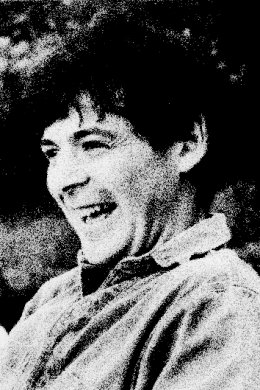
This adaptation of "Willie MacBride"exposes the futility of war, and contrasts it with the struggle for freedom in Ireland
(da/from questa pagina/this page).
O Tomos John Williams, mi welaf dy fedd
Ar gaeau glas Ffrainc sydd heddiw mewn hedd
Rwyt heddiw mor unig, mor bell o Fron Goch
A'r pabi yn unig sy'n cofio gwaed coch.
Mi welaf nad oeddyt ddim ond deunaw oed
Wrth ddisgyn i'r Somme - dyna hanes erioed,
Wrth ymladd dros wledydd a thros eu rhyddhau
Mi gefaist yn ddeunaw i'r ddaear dy gau.
Ond ni che'st d'alw'n arwr, na dy gyfri'n wlatgarwr,
Ac ni chwifiwyd y faner ar hanner y mast,
Ac ni wnaed uwch dy waed unrhyw wylo
Gan y rhai oedd â gwaed ar eu dwylo.
A phwy oeddan nhw ddwedodd wrthyt ysgwn
Mai swanc oedd i lanc ysgwyddo y gwn?
A phwy oeddan nhw efo'u hiwnifform "swell"
A'th ddriliodd a'th fartsiodd, a'th fwrdrodd mewn sbel.
Ni welaist drwy hyn tan rhy hwyr yn y dydd
Ni che'st ti mo'r cyfle i dyfu'n ddyn rhydd
Ond drwy'r mwg a thrwy'r medals wrth ddisgyn i'r llawr
Mi welaist nad nhw fyddai'n wylo yn awr.
Ond ni che'st d'alw'n arwr, na dy gyfri'n wlatgarwr,
Ac ni chwifiwyd y faner ar hanner y mast,
Ac ni wnaed uwch dy waed unrhyw wylo
Gan y rhai oedd â gwaed ar eu dwylo.
Roedd eraill mewn cell yn dy annwyl Fron Goch
Yn llwydaidd eu gwedd yn cael bwyd cibau'r moch
Ond fflam eu gwrthryfel a gadwant ynghyn
A Werddon a gododd drwy safiad di-gryn.
Mi gawsant gaethiwed am geisio rhyddhau
Eu gwlad hwy o'r dwylo a'th yrrodd i'th wae
A mam yn Fron Goch oedd a'i chalon yn drom
Wrth glywed fod llencyn yn llwch yn y Somme.
Ond ni che'st d'alw'n arwr, na dy gyfri'n wlatgarwr,
Ac ni chwifiwyd y faner ar hanner y mast,
Ac ni wnaed uwch dy waed unrhyw wylo
Gan y rhai oedd â gwaed ar eu dwylo.
Mae'r dynion yn Llundain a'u seddau Whitehall
Yn gyrru i ryfel rhai byth na ddon `nôl;
O slymiau tre Glasgow neu Cymru cefngwlad
Mae hogiau dinewid yn cyrchu i'r gâd.
I farw neu ynteu i ladd eu cyd ddyn
Yn enw rhyw rhyddid nas gwyddo ei hun;
Rwyt ti, Tomos Williams, dros ddim yn y byd
Yn disgyn yn `sglyfaeth i'r ffosydd o hyd.
Ond ni che'st d'alw'n arwr, na dy gyfri'n wlatgarwr,
Ac ni chwifiwyd y faner ar hanner y mast,
Ac ni wnaed uwch dy waed unrhyw wylo
Gan y rhai oedd â gwaed ar eu dwylo.
inviata da Riccardo Venturi - 4/11/2005 - 00:03

Versione greca di Gian Piero Testa
Μετέφρασε στα Ελληνικά ο Τζαν Πιέρο Τέστα
Greek version by Gian Piero Testa
Πως περνάς, Ουίλλιαμ Μεκμπράιντ μωρέ φαντάρε;
Μήπως σ'ενοχλώ αν κάθομαι λιγάκι εδώ ανάμεσα στους τάφούς σας
Λιγάκι να ξεκουραστώ μεσ'στην αντηλιά την θερινή;
Ολόκληρη μέρα βάδισα και πια δεν θα μπορέσω.
Και πάνω στην ταφόπετρα βλέπω γραφτό που ήσουνα δεκαεννιά χρονών μονάχα
Το χιλιαεννιακοσιαδεκαέξι σαν πρόλαβες τους ήρωες χαμένους.
Ε, κάλλιο, εύχομαι, αν γρήγωρα και εντίμως έχεις πεθάνει
'Η να'χεις φριχτό κι αργό τον θάνατο, Ουίλλι Μεκμπράιντ, σου έλακε ο κλήρος;
Αργά χτυπάγανε τα ταμπούρλα;
Ηχούσαν σιγανά οι καραμούζες;
Χαιρετάγανε ντουφέκια ενώ κατέβαινες στο χώμα;
Οι σάλπιγγες εν χορώ "The Last Post" αδούσανε;
Κι αδούσε η πίπιζα "The Flowers o' the Forest";
Γυναίκα ή αρραβωνιασμένη άφησες στην αναμονή,
και μέσ'σε πιστή καρδιά μήπως φυλάσσεσαι για πάντα;
Κι αν χρόνια τόσο πολλά πέρασανε από που έχεις φύγει,
για κάποια πιστή καρδιά μένεις δεκαεννιαετής και τώρα;
'Η τόσο παντέρμος ξένος είσαι που κανείς δεν σε γνωρίζει
για πάντα φυλακισμένος πέρα από γυαλινό πλακάκι
σε ραγισμένη τσαλακωμένη διαστιγμένη παλιά φωτογραφία
που ξεζωριάζει κλειστή σ'ένα δερμάτινο πλαίσιο καστανό;
Αργά χτυπάγανε τα ταμπούρλα;
Σιγανά ηχούσαν οι καραμούζες;
Χαιρετάγανε ντουφέκια ενώ κατέβαινες στο χώμα;
Οι σάλπιγγες εν χορώ "The Last Post" αδούσανε;
Κι αδούσε η πίπιζα "The Flowers o' the Forest";
Εδώ λάμπει ο ήλιος τώρα, πάνω στους κάμπους πράσινους της Γαλλίας,
Ζεστή αργοφυσάει νοτιά και κόκκινες χορεύουνε οι παπαρούνες.
Κάτω απ' τ'αλέτρι ξεφάνηκαν οι τάφροι χαρακωμάτων,
Αέριο τώρα πια δεν έχει μήτε σύρματα αγκαθωτά μήτε ντουφέκια.
Αλλά σ'ετούτο εδώ το κοιμητήριο μένει διαρκή Ζώνη Ουδετέρα,
Των σταυρών απέραντη η ασπρίλα δείχνει χωρίς λαλία
Τ'αδιαφορία τυφλή τ' ανθρώπου για τους ανθρώπους,
Για μιά γενιάν ολόκληρη που σφάχτηκε και καταρρίφθηκε.
Αργά χτυπάγανε τα ταμπούρλα;
Σιγανά ηχούσαν οι καραμούζες;
Χαιρετάγανε ντουφέκια ενώ κατέβαινες στο χώμα;
Οι σάλπιγγες εν χορώ "The Last Post" αδούσανε;
Κι αδούσε η πίπιζα "The Flowers o' the Forest";
Και τώρα πως μπορώ να μην ερωτηθώ, Ουίλλι Μεκμπράιντ,
όσοι κείτονται εδώ το ξέρουν γιατί έχουν πεθάνει;
Αληθώς το πίστεψες το γιατί που σου'χαν πει;
Αληθώς το πίστεψες που ο πόλεμος θα ήταν ο στερνός;
Κι ο πόνος κι η λύπη, η δόξα κι η ντροπή,
Tο να σκοτώνεις, το να πεθαίνεις, όλα επί ματαίω γίνηκαν.
Γιατί, Ουίλλι Μεκμπράιντ, όσα είχαν γίνει και πάλι έχουνε γίνει,
Πάλι, πάλι, πάλι, πάλι.
Αργά χτυπάγανε τα ταμπούρλα;
Σιγανά ηχούσαν οι καραμούζες;
Χαιρετάγανε ντουφέκια ενώ κατέβαινες στο χώμα;
Οι σάλπιγγες εν χορώ "The Last Post" αδούσανε;
Κι αδούσε η πίπιζα "The Flowers o' the Forest"
inviata da Gian Piero Testa - 13/2/2012 - 12:57
A Portuguese translation of the song is included in this letras.br page, but it is so uncorrect (some parts are totally misunderstood) that we decided to use it only as a "base" and to retranslate the rest of the lyrics. [RV]
TERRA DE NINGUÉM
Oh como vai, jovem Willy McBride?
Você se importa se eu sentar aqui perto de seu túmulo?
e descansar um pouco no escaldante sol de verão,
Eu andei o dia todo, e estou quase acabando.
Eu vejo pela sua lápide que você tinha apenas dezenove
quando se juntou aos heróis caídos em 1916.
Bem, eu espero que você morreu rápido
e espero que você morreu sem sofrimento
ou, Willy McBride, a sua morte foi lenta e obscena?
Eles batiam o tambor devagar?
Eles tocavam baixo a cornamusa?
Davam tiros de espingarda enquanto te desciam?
A banda tocava “The last post” em coro?
As gaitas tocavam “The flower o' the forest”?
Você deixou uma esposa ou uma namorada em casa?
Em algum coração fiel sua memória está conservada,
e mesmo se você morreu em 1916
para aquele coração fiel você terá para sempre dezenove?
Ou você é um estranho sem nem mesmo um nome
para sempre encerrado atrás de um painel de vidro
numa velha fotografia rasgada, esfarrapada e manchada
e desbotada em amarelo numa moldura de couro marrom?
Eles batiam o tambor devagar?
Eles tocavam baixo a cornamusa?
Davam tiros de espingarda enquanto te desciam?
A banda tocava “The last post” em coro?
As gaitas tocavam “The flower o' the forest”?
O sol brilha nesses verdes campos da França,
o vento quente sopra gentilmente e as papoilas vermelhas dançam.
As trincheiras sumiram-se debaixo do arado,
já não há gas, arame farpado ou armas atirando.
Mas esse cemitério sempre é terra de ninguém,
as incontáveis cruzes brancas são testemunhas mudas
da indiferença cega do homem para o seu companheiro,
de toda um geração que foi massacrada e danada.
Eles batiam o tambor devagar?
Eles tocavam baixo a cornamusa?
Davam tiros de espingarda enquanto te desciam?
A banda tocava “The last post” em coro?
As gaitas tocavam “The flower o' the forest”?
E eu não posso passar sem perguntar a mim mesmo
se os que jazem aqui sabem porque morreram.
Você realmente acreditou neles quando te disseram a causa,
você realmente acreditou que essa guerra acabaria com as guerras?
Bem, o sofrimento, a tristeza, a glória, a vergonha,
o matar e o morrer, tudo foi inútil,
oh Willy McBride, tudo isso aconteceu de novo
e de novo, e de novo, e de novo, e de novo.
Eles batiam o tambor devagar?
Eles tocavam baixo a cornamusa?
Davam tiros de espingarda enquanto te desciam?
A banda tocava “The last post” em coro?
As gaitas tocavam “The flower o' the forest”?
inviata da CCG/AWS Staff - 5/6/2012 - 18:27
Svensk översättning av Riccardo Venturi
Traduzione svedese di Riccardo Venturi
Swedish translation by Riccardo Venturi
6/6/2012
Hur mår du, unge Willy McBride?
Har du något emot om jag sitter här vid din grav
och jag tar lite vila i den varma sommarsolen?
Jag vandrade hela dagen och är nästan kraftlös.
Jag ser på din gravsten att du bara var nitton
när du gick med hjältarna som föll 1916.
Så, jag hoppas att du dog snabbt
och, så hoppas jag, utan plåga,
eller, Willy McBride, var din död långsam och slipprig?
Slog de långsamt på trummorna?
Spelade de tyst säckpiporna?
Sköt de en gevärssalva vid din begravning?
Sjöng de “The last post” i kår?
Spelade piporna “The flower o' the forest”?
Lämnade du en hustru eller en käresta hemma?
I något trofast hjärta är ditt minne bevarat,
och även om du dog 1916
är du för det här trogna hjärtat alltid nitton?
Eller är du en främling utan även ett namn
för alltid innesluten bakom en glasruta
i en gammal sönderriven, tillskrynklad och fläckad bild
som gulnar i en brun läderram?
Slog de långsamt på trummorna?
Spelade de tyst säckpiporna?
Sköt de en gevärssalva vid din begravning?
Sjöng de “The last post” i kår?
Spelade piporna “The flower o' the forest”?
Solen strålar i de här gröna fälten i Frankrike,
den varma vinden blåser milt och de röda vallmorna dansar.
Skyttegravarna har försvunnit under plogen,
ingen gas, ingen taggtråd, inget skjutande vapen mera.
Men den har kyrkogården är alltid ingenmansland,
de oräkneliga vita korsen är stumma vittnen
till människans blinda likgiltighet för medmänniskan,
till en hel generation som blev omintetgjord och fördömd.
Slog de långsamt på trummorna?
Spelade de tyst säckpiporna?
Sköt de en gevärssalva vid din begravning?
Sjöng de “The last post” i kår?
Spelade piporna “The flower o' the forest”?
Och jag kan inte låta bli att undra
om de, som vilar här, vet vad de dog för.
Verkligen trodde du dem, när de sade dig därför,
verkligen trodde du att det här kriget skulle vara det sista?
Ser du, lidandet, sorgen, äran, skammen,
att döda och att dö, allt det har varit onödigt,
därför, Willy McBride, allt det har skett igen,
och igen, och igen, och igen, och igen.
Slog de långsamt på trummorna?
Spelade de tyst säckpiporna?
Sköt de en gevärssalva vid din begravning?
Sjöng de “The last post” i kår?
Spelade piporna “The flower o' the forest”?
Versione finlandese di Juha Rämö
Suomennos: Juha Rämö
Finnish version by Juha Rämö
Version finnoise de Juha Rämö
Mitä kuuluu, sotamies Willie McBride?
Sopiiko, että istun tässä hautasi äärellä
ja lepään hetken kesän lämpimässä auringossa?
Olen aivan uuvuksissa taivallettuani koko päivän.
Näen hautakivestäsi, että olit vain yhdeksäntoista,
kun liityit kaatuneitten kunniakkaaseen joukkoon 1916.
Toivon, että kuolit nopeasti ja että sinun ei tarvinnut kärsiä.
Vai oliko kuolemasi hidas ja tuskallinen, Willie McBride?
Löivätkö rummut hitaasti tahtia?
Soivatko säkkipillit surun säveliä?
Kaikuivatko kunnialaukaukset, kun sinut laskettiin maahan?
Soittivatko vasket Viimeistä vartiovuoroa? [1]
Tai säkkipillit Metsän kukkia? [2]
Jäikö sinulta vaimoa tai mielitiettyä?
Jonkin uskollisen sydämen kätköissä muistosi elää.
Ja vaikka kuolit jo vuonna 1916,
tuossa uskollisessa sydämessä olet edelleen yhdeksäntoista.
Vai oletko vain muukalainen vailla nimeä,
ikuisesti lasin alle suljettu
vanha, risainen, laikukas valokuva
kellastumassa ruskeassa nahkakehyksessään?
Löivätkö rummut hitaasti tahtia?
Soivatko säkkipillit surun säveliä?
Kaikuivatko kunnialaukaukset, kun sinut laskettiin maahan?
Soittivatko vasket Viimeistä vartiovuoroa?
Tai säkkipillit Metsän kukkia?
Aurinko luo valoaan näille Ranskan vihreille kunnaille,
ja lämmin tuulenvire saa punaiset unikot tanssimaan.
Juoksuhaudat ovat kadonneet mulloksen alle,
poissa ovat kaasupilvet, piikkilangat ja aseiden jylinä.
Mutta tämä hautausmaa on vieläkin ei-kenenkään-maata,
missä lukemattomat valkoiset ristit todistavat ääneti
ihmisten sokeasta piittaamattomuudesta toisiaan kohtaan
ja kokonaisesta sukupolvesta, joka lepää täällä teurastettuna.
Löivätkö rummut hitaasti tahtia?
Soivatko säkkipillit surun säveliä?
Kaikuivatko kunnialaukaukset, kun sinut laskettiin maahan?
Soittivatko vasket Viimeistä vartiovuoroa?
Tai säkkipillit Metsän kukkia?
Ja nyt voin vain ihmetellä, Willie McBride,
tiesivätkö kaikki tänne haudatut, miksi he kuolivat.
Uskoitko todella, kun sinulle kerrottiin syy?
Uskoitko todella, että se sota lopettaisi kaikki sodat?
Mutta kärsimys, suru, kunnia, häpeä –
tappaminen, kuoleminen – kaikki se oli turhaa.
Sillä, Willie McBride, se on kaikki tapahtunut yhä uudelleen,
ja uudelleen, ja uudelleen, ja uudelleen, ja uudelleen.
Löivätkö rummut hitaasti tahtia?
Soivatko säkkipillit surun säveliä?
Kaikuivatko kunnialaukaukset, kun sinut laskettiin maahan?
Soittivatko vasket Viimeistä vartiovuoroa?
Tai säkkipillit Metsän kukkia?
[2] Viittaa vanhaan skotlantilaiseen kansansävelmään nimeltä The Flowers of the Forest, jota soitetaan tavallisesti säkkipilleillä ja jonka lauluversiossa muistellaan skottiarmeijan Floddenin taistelussa vuonna 1513 englantilaisille kärsimää tappiota.
inviata da Juha Rämö - 23/11/2024 - 17:09
Ну как ты, юный Вилли МакБрайд?
Ты не возражаешь если я присяду здесь, у твоей могилы?
И отдохну немного под теплым, летним солнышком
Я шел весь день и я почти пришел
Я вижу по твоему могильному камню, что тебе было всего 19
Когда ты присоединился к Великой бойне в 1916
И я надеюсь, что ты умер быстро и ты умер чисто
Или же, Вилли МакБрайд, это было медленно и непристойно?
И били ли медленно барабаны
И флейты играли ли негромко
И играли ли похоронный марш когда тебя опускали вниз
Сыграли ли тебе последний сигнал на горне и пели ли хором?
И играли ли трубы ''Лесные цветы''?
И покинул ли ты жену или любимую
В чьем верном сердце бережно хранится память о тебе
И несмотря на то, что ты погиб в 1916
В том верном сердце тебе навечно 19.
Или был ли ты незнакомцем, даже без имени
Навсегда сохранившимся за старым стеклом
И постепенно исчезающим за желтизной
На какой-то испачканной, порванной фотографии
В кожаной, коричневой рамке
И били ли медленно барабаны
И флейты играли ли негромко
И играли ли похоронный марш когда тебя опускали вниз
Сыграли ли тебе последний сигнал на горне и пели ли хором?
И играли ли трубы ''Лесные цветы''?
Солнце освещает эти зеленые поля Франции
Теплый ветер нежно веет и красные маки танцуют
Окопы давно исчезли под плугом
Нет газа, нет колючей проволоки и орудия теперь не стреляют
Но здесь, на этом кладбище, которое по-прежнему Ничейная Земля
Бесчисленные белые кресты стоят немыми свидетелями
Людской слепоте безразличия к своим собратьям,
И целому поколению которое было безжалостно убито и проклято
И били ли медленно барабаны
И флейты играли ли негромко
И играли ли похоронный марш когда тебя опускали вниз
Сыграли ли тебе последний сигнал на горне и пели ли хором?
И играли ли трубы ''Лесные цветы''?
И я не могу не спросить, Вилли МакБрайд,
Все те, кто лежит здесь: знали за что они умерли?
Ты действительно верил, когда они говорили тебе "Причину"
Ты действительно верил, что эта война положила бы конец войнам?
Страдания, скорбь, слава, позор
Убийства и смерти все это было напрасно?
Ох, Вилли МакБрайд, все это повторилось вновь и не раз,
И не раз, и не раз, и не раз, и не раз
И били ли медленно барабаны
И флейты играли ли негромко
И играли ли похоронный марш когда тебя опускали вниз
Сыграли ли тебе последний сигнал на горне и пели ли хором?
И играли ли трубы ''Лесные цветы''?
inviata da Riccardo Venturi - 25/1/2020 - 17:07
Зеленые поля Франции (Ничья земля) — это песня Эрика Богла, написанная в 1976 году после посещения военного кладбища погибших во время Первой мировой войны солдат во Франции. В стихах также делаются отсылки на шотландскую военную песню "The Flowers of the Forest " (Лесные цветы) и британскую "The Last Post" (Последний куплет).
"Это песня была написана о военных кладбища во Фландрии и Северной Франции. В 1976 году я и моя жена посетили три или четыре таких кладбища, и мы обнаружили, что там в основном похоронены молодые ребята" — Эрик Богл.
Ну как поживаешь, юный Вилли Макбрайд?
Не возражаешь, если я присяду у края твоей могилы,
И отдохну под жарким летним солнцем?
Я бродил целый день и немного устал.
Я вижу, что тебе было всего девятнадцать,
Когда ты участвовал в великом поражении в 1916-ом.
Мне хотелось бы думать, что ты умер быстро и не чувствовал боли,
Или, Вилли Макбрайд, ты умирал медленно и мучительно?
Отбивали ли барабанщики медленную дробь?
А звучали ли тихо флейты?
А играли ли они похоронный марш, когда тебе хоронили?
А оркестр спел последний куплет и припев?
А волынщики сыграли "Лесные цветы"?
Осталась ли у тебя жена или возлюбленная,
Что хранит верную память в своем сердце?
И хотя ты погиб в далеком 1916-ом,
Для ее верного сердца ты навсегда остался мальчишкой.
Или ты безымянный странник,
Навсегда оставшийся под пыльной стеклянной рамкой
На старой потрепанной и испачканной фотографии?
И медленно исчезаешь под желтыми и коричневыми пятнами.
Отбивали ли барабанщики медленную дробь?
А звучали ли тихо флейты?
А играли ли они похоронный марш, когда тебе хоронили?
А оркестр спел последний куплет и припев?
А волынщики сыграли "Лесные цветы"?
Солнце клонится к закату над зелеными полями Франции,
Тихо дует теплый ветер и колыхаются маки.
Траншеи исчезли давно под фермерским плугом,
Нет больше газа, колючей проволоки и залпов винтовок,
Но эти могилы до сих пор остаются ничейной землей,
А нескончаемые белые кресты безмолвно стоят,
Оставаясь свидетелями слепого людского безразличия,
К целому поколению, которое было проклято и уничтожено.
Отбивали ли барабанщики медленную дробь?
А звучали ли тихо флейты?
А играли ли они похоронный марш, когда тебе хоронили?
А оркестр спел последний куплет и припев?
А волынщики сыграли "Лесные цветы"?
Я ничего не мог сделать, но мне интересно, Вилли Макбрайд,
Все лежащие здесь знали, за что они умирали?
Верили ли они, когда им называли "причину"?
Верили ли они, что эта война закончит все войны?
Почувствовали ли они страдания, скорбь, славу или позор
Когда узнали, что зря убивали и умирали?
О, Вилли Макбрайд это все повторилось вновь.
И снова, и снова, и снова...
Отбивали ли барабанщики медленную дробь?
А звучали ли тихо флейты?
А играли ли они похоронный марш, когда тебе хоронили?
А оркестр спел последний куплет и припев?
А волынщики сыграли "Лесные цветы"?
inviata da Riccardo Venturi - 25/1/2020 - 17:15
Traduzione polacca di Azalia (da Lyricstranslate)
Polish translation by Azalia (from Lyricstranslate)
Jak się masz, szeregowy Williamie McBride?
Nie przeszkadza ci, jeśli usiądę tu, przy twym grobie?
Odpocznę przez chwilę w ciepłym letnim słońcu;
Boże! szedłem cały dzień i jestem wykończony.
Widzę po nagrobku, że miałeś tylko 19 lat,
gdy dołączyłeś do poległych w chwale w roku 1916.
Cóż, mam nadzieję, że umarłeś szybko i higienicznie,
czy też, Willie McBride, śmierć była powolna i obrzydliwa?
Czy bili wolno w bębny,
czy zagrali smutno na piszczałkach,
czy oddali salwę honorową przy składaniu cię do grobu?
Czy trąbki chórem zaintonowały "The Last Post"? [1]
Czy dudy zagrały "The Flowers of the Forest"? [2]
Czy pozostawiłeś żonę lub narzeczoną?
Czy wierne czyjeś serce chroni twą pamięć
i, choć umarłeś w roku 1916,
dla tego lojalnego serca masz zawsze 19 lat?
Czy może jesteś bezimiennym nieznajomym,
na zawsze schowanym za szklaną szybką
na starej fotografii, naddartej, wymiętej i poplamionej,
żółknącej w brązowej skórzanej ramce?
Czy bili wolno w bębny,
czy zagrali smutno na piszczałkach,
czy oddali salwę honorową przy składaniu cię do grobu?
Czy trąbki chórem zaintonowały "The Last Post"?
Czy dudy zagrały "The Flowers of the Forest"?
Słońce opromienia zielone pola Francji,
łagodnie wieje ciepły wiatr i tańczą czerwone maki.
Okopy dawno już znikły pod pługiem,
nie ma gazu i kolczastego drutu i nic już teraz nie strzela.
Lecz tu, na tym cmentarzu, wciąż jest ziemia niczyja;
niezliczone białe krzyże stoją jak niemi świadkowie
człowieczej ślepej obojętności wobec drugiego człowieka
i całego pokolenia tych, których zmasakrowano i złożono w ofierze.
Czy bili wolno w bębny,
czy zagrali smutno na piszczałkach,
czy oddali salwę honorową przy składaniu cię do grobu?
Czy trąbki chórem zaintonowały "The Last Post"?
Czy dudy zagrały "The Flowers of the Forest"?
I nie mogę się teraz pozbyć myśli, Willie McBride,
czy ci wszyscy, którzy tu leżą, wiedzą, czemu umarli?
Czy naprawdę im uwierzyłeś, gdy ci mówili o „Sprawie”?
Czy naprawdę wierzyłeś, że ta wojna zakończy wszelkie wojny?
Cóż… cierpienie, smutek, chwała, wstyd,
zabijanie, umieranie – to wszystko było na darmo,
Bo, Willie McBride, to wszystko wydarzyło się znów,
i znów, i znów, i znów, i znów.
Czy bili wolno w bębny,
czy zagrali smutno na piszczałkach,
czy oddali salwę honorową przy składaniu cię do grobu?
Czy trąbki chórem zaintonowały "The Last Post"?
Czy dudy zagrały "The Flowers of the Forest"?
[2] Stara melodia szkocka grana na dudach ku czci poległych na wojnie
inviata da Riccardo Venturi - 6/9/2022 - 06:03
Versione croata / Croatian version / Version croate / Kroatiankielinen versio:
Beekeeper (L. Trans.)
Pa kako si, mladi Willie McBride?
Zamjeraš li ako sjednem ovdje podno tvoga groba
I odmorim neko vrijeme na toplom ljetnom suncu,
Hodao sam cijeli dan i skoro sam gotov.
I vidim po tvom nadgrobnom spomeniku da ti je bilo tek 19
kada si se priključio Palima 1916.
E pa, nadam se da si umro brzo
I nadam se da si umro čisto,
Ili, Willie McBride, je bilo sporo i odvratno?
Jesu li udarali bubanj polako?
Jesu li svirali frulu tiho?
Jesu li oglasili posmrtni marš dok su te spuštali?
Je li orkestar izveo "Last Post" [1] u zboru?
Jesu li gajde svirale "Flowers of the Forest"? [2]
I jesi li za sobom ostavio ženu ili dragu?
Je li sjećanje na tebe pohranjeno u nekom odanom srcu?
Pa iako si poginuo 1916,
Tome odanom srcu zauvijek imaš 19.
Ili si stranac bez čak i imena,
Zauvijek pohranjen iza nekog starog staklenog okna,
Na staroj fotografiji, pokidanoj, ishabanoj i isflekanoj koja žuti
U smeđem kožnom okviru.
Jesu li udarali bubanj polako?
Jesu li svirali frulu tiho?
Jesu li oglasili posmrtni marš dok su te spuštali?
Je li orkestar izveo "Last Post" u zboru?
Jesu li gajde svirale "Flowers of the Forest"?
Sunce sja na ova zelena polja Francuske,
Topli vjetar blago piri, a crveni makovi plešu.
Rovovi su davno nestali pod oranicama,
Sada više nema plina, nema bodljikave žice, nema pucnjeva pušaka...
Ali ovdje na ovome groblju, tu je još uvijek Ničija Zemlja..
Nebrojeni bijeli križevi stoje kao nijemi svjedoci
čovjekovoj slijepoj ravnodušnosti prema svom bližnjemu
I cijeloj generaciji koja je iskasapljena i prokleta.
Jesu li udarali bubanj polako?
Jesu li svirali frulu tiho?
Jesu li oglasili posmrtni marš dok su te spuštali?
Je li orkestar izveo "Last Post" u zboru?
Jesu li gajde svirale "Flowers of the Forest"?
I ne mogu, a da se ne zapitam, Willie McBride:
Da li svi ovi što leže tu znaju zašto su umrli?
Jeste li im stvarno vjerovali kad su vam rekli Razlog?
Jeste li stvarno vjerovali da će ovaj rat okončati ratove?!
E pa patnja, žalost, slava, sramota..
Ubijanje i umiranje.. sve je bilo uzalud!
O, Willie McBride, sve se to dogodilo ponovno,
I opet, i opet, i opet, i opet!
Jesu li udarali bubanj polako?
Jesu li svirali frulu tiho?
Jesu li oglasili posmrtni marš dok su te spuštali?
Je li orkestar izveo "Last Post" u zboru?
Jesu li gajde svirale "Flowers of the Forest"?
[2] "Flowers of the Forest" (Šumsko cvijeće) je tradicionalna škotska pjesma koju, zbog stihova i iz poštovanja, gajdaši uglavnom izvode u javnosti samo na pogrebima i službama sjećanja.
inviata da L'Anonimo Toscano del XXI Secolo - 23/11/2024 - 18:28
Traduzione in esperanto di Alessio (da Lyricstranslate)
Esperanto translation by Alessio (from Lyricstranslate)
Nu kiel vi fartas juna Willie McBride
Ĉu vi ĝenas se mi sidas ĉi tie apud via tombo
Kaj ripozu iom en la varma somera suno
Mi promenis la tutan tagon kaj mi preskaŭ finis
Kaj mi vidas laŭ via tomboŝtono ke vi estis nur 19-jara
Kiam vi aliĝis al la granda falinto1 en 1916
Nu mi esperas ke vi mortis rapide kaj mi esperas ke vi mortis pure
Aŭ Willie McBride ĉu ĝi estis malrapide kaj obscene
Ĉu ili batis la tamburon malrapide
Ĉu ili ludis la fifron humile
Ĉu ili sonigis la mortmarŝon dum ili malaltigis vin
Ĉu la grupo ludis la "Last Post" [1] kaj refrenkoruso?
Ĉu la sakŝalmoj ludis la "Flowers of the Forest"? [2]
Kaj ĉu vi postlasis edzinon aŭ amatinon
En iu lojala koro ĉu via memoro estas sanktigita
Kaj kvankam vi mortis reen en 1916
Al tiu lojala koro vi estas por ĉiam 19
Aŭ ĉu vi estas fremdulo sen eĉ nomo
Eterne sanktigita malantaŭ iu malnova vitrofenestro
En malnova foto ŝirita ĉifona kaj makulita
Kaj flaviĝanta en bruna leda kadro
Ĉu ili batis la tamburon malrapide
Ĉu ili ludis la fifron humile
Ĉu ili sonigis la mortmarŝon dum ili malaltigis vin
Ĉu la grupo ludis la "Last Post" kaj refrenkoruso?
Ĉu la sakŝalmoj ludis la "Flowers of the Forest" ?
La suno brilas sur ĉi tiuj verdaj kampoj de Francio
La varma vento milde blovas kaj la ruĝaj papavoj dancas
La tranĉeoj malaperis longe sub la plugilo
Neniu gaso neniu pikdrato neniuj pafiloj pafante nun
Sed ĉi tie en ĉi tiu tombejo kiu ankoraŭ estas Nenieslando
La sennombraj blankaj krucoj staras en muta atestanto
Pri blinda indiferenteco de viro al sia kunhomo
Kaj tuta generacio kiuj estis buĉitaj kaj damnitaj
Ĉu ili batis la tamburon malrapide
Ĉu ili ludis la fifron humile
Ĉu ili sonigis la mortmarŝon dum ili malaltigis vin
Ĉu la grupo ludis la "Last Post" kaj refrenkoruso?
Ĉu la sakŝalmoj ludis la "Flowers of the Forest" ?
Kaj mi ne povas ne scivoli ne Willie McBride
Ĉu ĉiuj kiuj kuŝas ĉi tie scias kial ili mortis
Ĉu vi vere kredis ilin kiam ili diris al vi "La Kaŭzo"
Ĉu vi vere kredis ke ĉi tiu milito finos militojn
Nu la sufero la malĝojo la gloro la honto
La mortigo kaj morto ĉio estis farita vane
Ho Willie McBride ĉio okazis denove
Kaj denove kaj denove kaj denove kaj denove
Ĉu ili batis la tamburon malrapide
Ĉu ili ludis la fifron humile
Ĉu ili sonigis la mortmarŝon dum ili malaltigis vin
Ĉu la grupo ludis la "Last Post" kaj refrenkoruso?
Ĉu la sakŝalmoj ludis la "Flowers of the Forest" ?
[2] "Floroj de la Arbaro" estas skota popolmelodio kaj verko de militpoezio festanta la malvenkon de la skota armeo de Jakobo la 4-a ĉe la Batalo de Flodden en septembro 1513. Pro la enhavo de la kantoteksto kaj la respekto por la melodio, ĝi estas unu el la malmultaj melodioj kiujn multaj ŝalmludantoj prezentos publike nur ĉe entombigoj aŭ funebraj ceremonioj, kun ludo alie limigita al privata praktiko aŭ por instrui aliajn ŝalmludantojn.
inviata da Riccardo Venturi - 6/9/2022 - 04:38
"Willie McBride's Reply" - Una parodia di "The Green Fields of France" di Stephen L.Suffet.
[1997]
Il testo è ripreso da/Lyrics are reproduced from questa pagina/this page.
My dear friend Eric, this is Willie McBride,
Today I speak to you across the divide
Of years and of distance, of life and of death,
Please let me speak freely with my silent breath.
You might think me crazy, you might think me daft,
I could have stayed back in Erin, where there wasn't a draft,
But my parents they raised me to tell right from wrong,
So today I shall answer what you asked in your song.
CHORUS:
Yes, they beat the drum slowly, they played the pipes lowly,
And the rifles fired o'er me as they lowered me down,
The band played "The Last Post" in chorus,
And the pipes played "The Flowers of the Forest."
Ask the people of Belgium or Alsace-Lorraine,
If my life was wasted, if I died in vain.
I think they will tell you when all's said and done,
They welcomed this boy with his tin hat and gun.
And call it ironic that I was cut down,
While in Dublin my kinfolk were fighting the Crown.
But in Dublin or Flanders the cause was the same:
To resist the oppressor, whatever his name.
CHORUS
It wasn't for King or for England I died,
It wasn't for glory or the Empire's pride.
The reason I went was both simple and clear:
To stand up for freedom did I volunteer.
It's easy for you to look back and sigh,
And pity the youth of those days long gone by,
For us who were there, we knew why we died,
And I'd do it again, says Willie McBride.
CHORUS
inviata da Riccardo Venturi - 19/8/2005 - 21:08
"No Man's Land" - Parodia irlandese di Crawford Howard e Fintan Valaly
Da/From The Mudcat Café
Una canzone molto famosa, specie se trasmessa e ritrasmessa dai media (o, come si dice, "fatta ascoltare in tutte le salse"), corre l'evidente rischio di annoiare qualche ascoltatore un po' invelenito. Inveleniti, e parecchio, lo devono essere stati gli autori di questa (peraltro esilarante) parodia irlandese degli anni '70, quando "The Green Fields Of France" davvero furoreggiava. Il risultato del loro invelenimento è, appunto, decisamente...velenoso.
Have you heard the old song about Willie Mc Bride?
If I hear it again, it'll turn me insides!
For its sung in the Springtime and its sung in the Fall
- And mostly by people who can't sing at all!
You go out for a drink on a Saturday night
For a pint and a song, and things are alright
Until some drunken bowsey sits down by your side
And he asks for the one about "Willie Mc Bride"!
Well you say you don't know it but this will not do
For now he's determined to sing it to you
So he spills half your drink and starts off in a key
That was never invented on land or on sea
And as time goes by sure the whole thing gets worse
For you soon realise that he knows every verse!
With his arm round your shoulder - 'cos now he's your friend
He's going to sing the damn thing to the end!
You go out to the Gents for a quarter of an hour
And you watch the TV in the old public bar
And then you come back thinking that he will tire
But he's still going on about gas and barbed wire!
And ten minutes later you're all in a trance
For he's up to his oxters in the Green Fields of France
The crowd are all quiet, you wont hear a peep
Does he not realise they've all gone to sleep?
Ah Willie Mc Bride, why the hell did you die?
The trouble you'd have saved if you'd come back alive
And got a wee job or signed "on the brew"*
We'd not have to listen to songs about you!
But still I don't know but I'm glad that you're dead
With the green fields of France piled on top of your head
For the trouble you caused since the day that you died
- Shooting's too good for you, Willie Mc Bride!
inviata da Riccardo Venturi - 30/11/2005 - 13:34
Riccardo Venturi - 1/2/2007 - 16:35
Le parole della canzone citata in The Green Fields Of France, di Jean Eliot (1756)
vedi Wikipedia
I've heard the lilting, at the yowe-milking,
Lassies a-lilting before dawn o' day;
But now they are moaning on ilka green loaning;
"The Flowers of the Forest are a' wede away".
Dool and wae for the order sent oor lads tae the Border!
The English for ance, by guile wan the day,
The Flooers o' the Forest, that fought aye the foremost,
The pride o' oor land lie cauld in the clay.
I've heard the lilting, at the yowe-milking,
Lassies a-lilting before dawn o' day;
But now they are moaning on ilka green loaning;
"The Flowers of the Forest are a' wede away".
I've heard the singing, at the ewe-milking,
Lassies a-singing before dawn of the day;
But now they are moaning on every milking-green;
"The Flowers of the Forest are all withered away".
Sorrow and woe for the order sent our lads to the Border!
The English for once, by guile won the day,
The Flowers of the Forest, that always fought the foremost,
The pride of our land lies cold in the clay.
I've heard the singing, at the ewe-milking,
Lassies a-singing before dawn of the day;
But now they are moaning on every milking-green;
"The Flowers of the Forest are all withered away".
GAFFAELLI
lui sa bene chi sono... - 15/1/2009 - 01:44
Un altro dei miracolacci di questo sito, porco bilghèiz!
Che dire? Se mi leggi, e SPERO che tu legga, segnati quanto segue:
Riccardo Venturi, via dell'Argingrosso 65/C
50142 Firenze
Telefono: 055-9060723
Cellulare: 339-4723095
email: k.riccardo@gmail.com
e fatti vivo ALLA SVELTA.
Proprio due giorni fa ero passato di fronte all'edicola della tu' mamma.
NB: questa te la ricordi? Ma siccome ci abbiamo gli "Extra", mica è escluso che prima o poi ci metta anche "Il signor Casini" e "Symphoitetés Oudenòs"!
Riccardo Venturi - 15/1/2009 - 03:41
Gibt es "The Green Fields Of France" auch auf Spanisch?
Grüße
Otto Zimmermann
Unglücklich haben wir bis jetzt keine spanische Übersetzung gefunden, aber unsere Forschungen gehen fort....
Grüße! [RV]
Otto Zimmermann - 22/9/2010 - 11:49
Alaskan song writer 907Britt (2010), as "William McBride"[7]
Alex Beaton (1995), on the album The Water Is Wide
Angelic Upstarts (1986), on the album Power Of The Press
Asonance (2000), in a Czech version "Zelené francouzské pláně" ("The Green Fields of France"), on the album Alison Gross
Attila the Stockbroker (1987)
Chris A Butler (English Singer/Songwriter) as "The Green Fields of France"[8]
Bok, Muir & Trickett (1978)
Bob Dylan
Clare Bowditch, Tim Rogers and Gotye (2007)
Jake Burns, on his album Drinkin' Again
Celtic Tenors (2002), on the album So Strong
Celtic Thunder (2009), as "The Green Fields of France", on the album Take Me Home
The Chieftains
The Clancy Brothers
Liam Clancy
Cobbers (Australian folk band), (1979) live on the album "Bushland Dreaming"
The Corries
Damh the Bard (2009), as "The Green Fields of France", on the album Tales from the Crow Man
Donovan (1980), on the album Neutronica
Dramtreeo (1992), as a duet on the album Dramtreeo[9]
Dropkick Murphys (2005), as "The Green Fields of France", on the album The Warrior's Code
The Dubliners
Eric Fish, in the German version by Hannes Wader
The Fenians (1999), on their album Band Of Rogues[10]
The Fureys
Fist Of Steel, as "Green Fields Of France"
Priscilla Herdman (1982), on the album Forgotten Dreams
The High Kings (2010) on the album "Memory Lane" as "Green Fields of France"
The Irish Tenors on "Ellis Island" as "The Green Fields of France"
Iain MacKintosh (1976), on the album Live in Glasgow
Kevin McKrell (1989), as "Greenfields of France", on the album Bound For Boston
The Men They Couldn't Hang (1984), as "The Green Fields of France"
Moke (2011), on the album Till death do us part theatre tour
Off Kilter (2005), on the album Kick It!
Peter, Paul and Mary (1990), as "No Man's Land", on the album Flowers and Stones
Prussian Blue (2005), as "Green Fields Of France", on the album The Path We Chose
Plethyn in a Welsh translation: "Gwaed ar eu Dwylo" (Blood on their Hands)[11]
French singer Renaud (2009), in a French version "Willie McBride", on the album Molly Malone
The Band, Bugles, Pipes & Drums of the Royal Irish Regiment (2001), as "Green Fields of France," on the album Last of the Great Whales
Robert Marr (2011) as "No Man's Land", on the album "Celticism"
Saga
John Schumann and the Vagabond Crew (2008), on the album Behind the Lines
Shilelagh Law, on the album Good Intentions
Skrewdriver (1988), as "Green Fields of France"
Sons of Maxwell (1996), as "The Green Fields of France"
Stage Bottles, as "Green Fields Of France"
Stiff Little Fingers
Stockton's Wing (1978), as "No Man's Land" on the album Stockton's Wing
June Tabor (1977), as 'No Mans Land', on the album Ashes and Diamonds and on Folk Anthology
Hannes Wader (1980), in a German version "Es ist an der Zeit" (1980)[2]
Charlie Zahm (1997), on the album Festival Favorites
DonQuijote82 - 24/3/2012 - 09:39
gianni - 9/7/2014 - 16:00
The Guardian

Apparently Joss Stone’s version of my song No Man’s Land has polarised opinion. I’ve had quite a large number of emails from irate or upset fans asking me if I’d heard it and why I could allow such a travesty. It’s upset me too, mind you, and irritated me as well.
Here was I in Adelaide, bumbling along in comfortable, crisis-free obscurity at the other end of the world, when suddenly a bushfire flared up back in the increasingly Disunited Kingdom, illuminating a depth of feeling about my song I hadn’t known existed. I usually don’t comment publicly on other artists’ versions of my music, but so many people have been in touch that I felt I should answer some of the questions I have been asked.
The copyright for No Man’s Land/The Green Fields of France is held by my UK publisher, Domino Publishing, who are ultimately responsible for approving applications to record it. When an artist wishes to record the song, they must apply for a mechanical license to do so from the relevant agency, and pay a licensing fee. Permission to record is more or less automatic, especially if, as in this case, the song has been recorded before.
Generally speaking, the first I get to know of any new recording is when I see any subsequent royalties appearing on my statements, a regrettably sporadic and generally minuscule occurrence. When the artist (or artists) in question records the cover version, they can, and often do, rework the song as to be almost unrecognisable from the original. This is especially true in jazz music, and is generally regarded as an acceptable creative exercise.
Although the publisher and/or composer could take legal action if they feel the original essence of the song has been irrevocably altered to its detriment, this very rarely happens. Unsurprisingly perhaps, the bottom line is that as long as royalties are paid, any wounded artistic feelings are usually put aside.
So then, to the most asked questions about this affair. Was my permission sought when Joss’s team decided to record No Man’s Land? No. Did I know what they proposed to do with the song when they decided to record it? No. Do I approve of what they have done to the song (missing verses, rock’n’roll arrangement)? No.
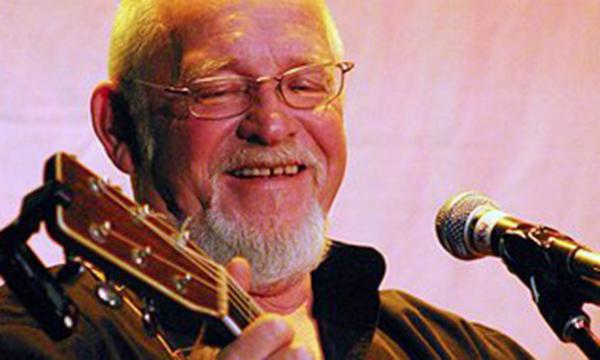
Believe it or not, when I wrote the song back in 1975, I intended the four verses of the original to gradually build up to what I hoped would be a climactic and strong anti-war statement. Missing out two and a half verses from the original four very much negates that intention.
As to the arrangement, however, it really comes down to whatever floats your musical boat. I would have thought a strong, mostly acoustic version would have done a better job of getting the message across, but that’s just personal preference – I’m a bit of an old-fart folkie. To do it acoustically and include all four verses and choruses would have made the song nearly seven minutes long and of doubtful commercial appeal in today’s music market.
There’s not much doubt that the shortened, up-tempo, rock-gospel version that Joss has recorded will appeal to a much broader cross-section of the listening public – and certainly to those who did not know the song existed until they heard Joss’s cover.
Is the strong anti-war message in the original song diminished in this recording? Of course. Missing out – or censoring, if you wish – some crucial verses does not help in this regard. But any diminishment is only in the eyes (or ears) of people who have heard my original. Those who haven’t must take Joss’s version on its own merits and make their own interpretation.
Does it follow that her cover glorifies war instead of condemning it? In my opinion it certainly doesn’t glorify it, but it doesn’t condemn it either. It starts off promisingly enough and then turns into a sing-along chorus type of song. Sentimentalising perhaps, trivialising even, but not glorifying.
Will my publisher or I be suing Joss Stone, Jeff Beck or the British Legion? You have to be joking. I can’t help feeling the longer this schemozzle drags on – peaceniks and tree hugging hippies versus the military/industrial/political homogeny – the more obscured the song’s message will become.
I would have wished for a version of my song that could have been truer to my original intentions in writing it: illustrating the utter waste of war while paying tribute to the courage and sacrifice of those brave young men who fought. But if Joss’s cover touches a heart or two here and there and makes some people reflect, perhaps for the first time, on the true price of war, then her version will have a measure of validity and value
CCG Staff - 3/2/2015 - 20:51
La canzone è un lamento composto in morte del re di Scozia James IV e di tutti i dignitari e combattenti scozzesi che furono massacrati dagli inglesi nella battaglia di Flodden Field, Northumberland, combattuta il 9 settembre 1513. Fu una vera disfatta tattica per gli scozzesi i quali, benchè più numerosi, ebbero perdite da 5 ad 8 volte superiori rispetto agli inglesi (7.000/13.000 morti contro 1.500 circa) e videro sterminati quasi integralmente i vertici del regno.
Oggi “Flowers of the Forest” – così come il bugle call “Last Post”, sempre citato da Bogle - viene suonata dai britannici e canadesi durante le funzioni per i soldati caduti nei vari teatri di guerra.
Bernart Bartleby - 16/9/2015 - 09:47
Da abbinare con la recente "premier" della traduzione ricardiana di "A ballade of the Scottysshe Kynge" (1513).
Il punto di vista degli sconfitti, per così dire.
Salud
Krzysiek - 13/11/2015 - 19:51
Krzysiek - 13/11/2015 - 19:53
Zenga Kuren - 14/7/2016 - 17:00
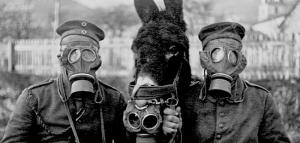
The Green Fields of France | Terre Celtiche Blog
eroi caduti nel 1916: la battaglia a cui si riferisce Boyle è la battaglia della Somme una delle più allucinante grande battaglia della Prima Guerra Mondiale, che si trascinò dal 1 luglio fino al 18 novembre 1916 vicino al fiume Somme in Francia, trasformatasi ben presto in una sanguinosa battaglia di logoramento. Dopo una settimana di bombardamento della postazione tedesca- protetta però nei rifugi sotterranei- lo Stato Maggiore Britannico mandò le sue truppe di fanteria alla morte facendole avanzare come facile bersaglio verso le mitragliatrici tedesche. Tramontata l’idea dello sfondamento, si proseguì con una guerra d’attrito, che fece guadagnare una manciata di kilometri ai britannici. In questa battaglia furono gli inglesi a usare il gas cloro contro i tedeschi (sia in parallelo al bombardamento iniziale che nel proseguo degli attacchi alle postazioni tedesche). La battaglia è ricordata anche per l’uso dei primi carri armati inglesi come mezzo bellico. I primi ad usare il fosgene furono però i tedeschi a Ypres (Fiandre). furono vari i gas letali della prima guerra chimica in Europa. Entrambi gli schieramenti non si fecero scrupolo ad utilizzare tutti i nuovi mezzi della chimica moderna come arma bellica, e se proprio vogliamo andare a vedere chi fu il primo a scagliare la pietra, sono stati i francesi nell’agosto del 1914 con le granate contenenti alfa bromo xylene (un gas lacrimogeno). Quel gesto spinse la Germania verso la ricerca di “soluzioni tossiche” contro gli avversari. "Alla fine del conflitto la Germania risultò essere stata la prima utilizzatrice di gas tossici con 68.000 tonnellate, seguita dalla Francia (36.000 tonnellate) e dall’Inghilterra (25.000 tonnellate); i morti furono circa 100.000 (più della metà sul fronte russo) oltre ad un milione di invalidi, spesso inabili alla vita civile.” (tratto da DISARMO CHIMICO)
Cattia Salto - 1/4/2021 - 11:51
Davvero bella (e anche un po' piacevolmente inaspettata) la tua pagina su Terre Celtiche dedicata a questa canzone, che è una delle più antiche di questo sito. Però ormai mi conosci, sai quanto sono "pignuolo" dal punto di vista linguistico e ti pregherei di fare una correzione sulla tua pagina, laddove hai riportato il video della versione in lingua gallese di Myrddin ap Dafydd (colgo l'occasione tra parentesi: in gallese, [dd] deve leggersi come il < th > inglese sonoro in that, e [f] come < v >, mentre [y] ha perlopiù il suono indistinto [ǝ], quindi: ['mǝrðin ap 'davǝð]). Hai scritto: "versione in gaelico gallese", ma il gallese non è una lingua "gaelica". E' sì una lingua celtica, ma appartiene casomai al ramo cosiddetto "britonico" (assieme al bretone e al cornico, o cornovagliese). I due rami delle lingue celtiche, il ramo gaelico (o "goidelico": irlandese, scozzese, mannese o manx) e quello britonico di cui sopra, sono ben distinti storicamente e linguisticamente. Una delle loro caratteristiche fonologiche più evidenti è l'eliminazione della labiale originaria indoeuropea [p] nel ramo gaelico, per cui, ad esempio, il latino piscis "pesce", porcus "porco", capra "capra" si confrontano col gaelico irlandese iasg, òrc, caora. Nel ramo britonico, invece, la [p] originaria è conservata: gallese pysgod, bretone pesk "pesce" ecc. Il gallese, casomai, si può chiamare "cimrico" dalla sua denominazione autoctona (Cymraeg); il Galles si chiama Cymru in gallese (bretone Kember, o Bro Gember "Pays de Galles"). Insomma, Cattia, togli quel "gaelico gallese" ! :-) Un abbraccio, tanti saluti e scusami per la mia insopportabile pignuoleria.
Riccardo Venturi - 1/4/2021 - 15:06
Grazie Riccardo per la precisazione! Spero di non aver disseminato impropriamente il termine gaelico gallese in altre pagine del Blog, ma per buona misura metterò la tua avvertenza nella
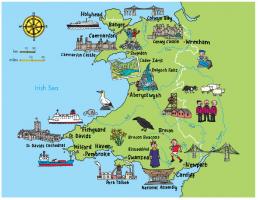
Galles (Wales!) | Terre Celtiche Blog
Cattia Salto - 1/4/2021 - 16:03
Vedo che, nella pagina di cui sopra, Roberto Pagani aveva già parlato di queste cose, e con parecchia competenza debbo dire! E vedo anche che parli del termine "Welsh" e di "Wales": è una parola che, dalla sua antica origine protogermanica (*waliskaZ) ha fatto il giro di tutta Europa con una storia incredibile. In pratica, sin dagli albori, è stata utilizzata da ogni popolo europeo per indicare (spregiativamente) il popolo o i popoli vicini che parlavano una lingua diversa dalla propria. Così i gallesi sono "Welsh" per gli anglosassoni perché parlano una lingua (molto) differente, i popoli latini (e gli italiani in particolare) sono "Welsch" per i tedeschi -con l'appendice del "Rotwelsch", il gergo furfantesco della malavita infarcito di parole yiddish e slave, gli italiani sono "Włosi" per i polacchi (e l'Italia "Włochy", prob. attraverso il tedesco), sempre gli italiani sono "Olasz" (e l'Italia "Olaszország") per gli ungheresi -i quali, peraltro, chiamano a volte "oláh" i rumeni, popolo di lingua latina, vale a dire, toh "valacchi", altra parola facente parte di questo ceppo. Il "cugino" greco, βλάχος [vlachos] significa "valacco, rumeno", o meglio "appartenente all'etnia dei Vlachoi" (Meglenorumeni) e, in greco popolare, "scemerello, piccolo imbecille". Tutto questo (e altro, di cui non ti sto a parlare) a partire dal quel primitivo *waliskaZ germanico...
Riccardo Venturi - 1/4/2021 - 16:23
Prometto che mi rifaccio viva su Antiwarsongs e spero che anche tu voglia intervenire in Terre Celtiche Blog (per tirarmi le orecchie o altro). Ricambio l'abbraccio e stammi bene
Cattia Salto - 1/4/2021 - 16:58
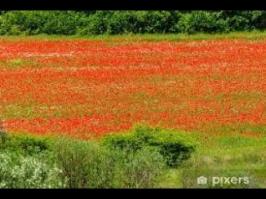
I verdi campi di Francia -
![[[https://ichef.bbci.co.uk/ace/standard/624/mcs/media/images/79906000/png/_79906152_williemcbride.png.webp|Willie McBride] [[https://ichef.bbci.co.uk/ace/standard/624/mcs/media/images/79906000/png/_79906152_williemcbride.png.webp|Willie McBride]](img/upl/_79906152_williemcbride.png.webp)
Willie McBride: Armagh soldier's song continues to resonate
Gennaio 2015: Dal casale di Joe McBride, nella contea di Armagh, si vedono dolci colline sotto cieli plumbei. Qui Joe conserva lettere e documenti della Grande Guerra legati a suo zio Willie McBride, il giovane soldato che forse ispirò la canzone di Eric Bogle, No Man’s Land (nota come The Green Fields of France).
Di recente, lo storico Trevor Geary ha confermato che Willie è davvero il soldato della canzone, anche se è morto a 21 anni e non a 19. Joe ha scoperto solo da poco questa connessione, ma ha sempre visto Willie come rappresentante di tutti i giovani caduti.

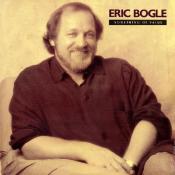

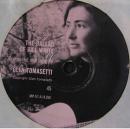
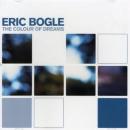




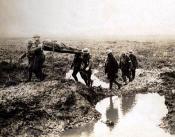

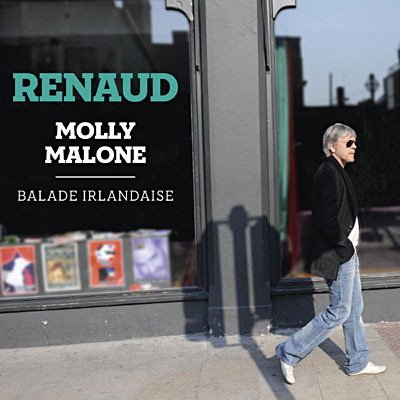
[1976]
Testo di Eric Bogle
Musica ripresa dalla ballata popolare scozzese
Waly, Waly, but Love be Bonny
Lyrics and Music by Eric Bogle
Tune: Waly, Waly, but Love be Bonny
(Traditional Scottish folksong)
Paroles: Eric Bogle
Mélodie: Waly, Waly, but Love be Bonny
(Chanson traditionnelle écossaise)
Sanat: Eric Bogle
Sävel: Waly, Waly, but Love be Bonny
(Perinteinen skotlantilainen kansanlaulu)
QUICK INDEX OF VERSIONS AVAILABLE [15 languages up to now]
LT = Lyrics Translate (now Lyrics Translations)
Italiano 1 (Riccardo Venturi 2003) – Italiano 2 (Andrea Buriani 2015) – Tedesco (Hannes Wader 1980) - Francese 1 (Renaud 2009) – Francese 2 (Riccardo Venturi 2005) – Spagnolo 1 (Monsieur de Sans-Foy 2011) LT - Spanish 2 (Panzer Kanone 2014) LT – Neerlandese 1 (Strijdkoor Kontrarie 2000) – Neerlandese 2 (Wolverlei, 1981) - Retoromanzo (Emil Schavut 2005) – Gallese (Myrddin ap Dafydd 1979) – Greco (Gian Piero Testa 2012) - Portoghese – Svedese (Riccardo Venturi 2012) - Finlandese (Juha Rämö) - Russo 1 (Crimson King 2020) LT - Russo 2 (Valera Suk 2020) LT - Polacco (Azalia 2022) LT – Croato (Beekeeper) LT – Esperanto (Alessio 2022) LT
Italian 1 (Riccardo Venturi 2003) – Italian 2 (Andrea Buriani 2015) – German (Hannes Wader 1980) - French (Renaud) – French (Renaud 2009) – French 2 (Riccardo Venturi 2005 - Spanish 1 (Monsieur de Sans-Foy 2011) LT - Spanish 2 (Panzer Kanone 2014) LT – Dutch 1 (Strijdkoor Kontrarie 2000) – Dutch 2 (Wolverlei, 1981) - Rhaetoromance (Emil Schavut 2005) – Welsh (Myrddin ap Dafydd 1979) – Greek (Gian Piero Testa 2012) - Portuguese – Swedish (Riccardo Venturi 2012) - Finnish (Juha Rämö) LT - Russian 1 (Crimson King 2020) LT - Russian 2 (Valera Suk 2020) LT – Polish (Azalia 2022) – Croatian (Beekeeper) LT – Esperanto (Alessio 2022) LT
Una straordinaria canzone (forse una delle più belle canzoni contro la guerra mai scritte). Per il suo argomento, può essere considerata "gemella" di un'altra stupenda canzone, Vladslo di Willem Vermandere.
Dopo aver visitato i cimiteri di guerra francesi nei primi anni '70, Eric Bogle trasformò una canzone popolare scozzese in un drammatico colloquio fittizio (tecnica compositiva che usa assai di frequente) con il soldato semplice William McBride. Forse Bogle fu ispirato da una pietra tombale che aveva visto. A lungo si è creduto che il soldato ed il nome fossero fittizi.
Piet Chielens, coordinatore del Museo Bellico "In Flanders Fields" a Yprès, in Belgio, ed organizzatore dei concerti annuali per la pace nelle Fiandre, una volta ha controllato tutto il milione e settecentomila nomi di caduti registrati dalla Commissione di Guerra del Commonwealth, trovandovi dieci soldati semplici chiamati William McBride.
Tre di questi William McBride caddero nel 1916, due erano membri del Northern Irish Regiment tra i Royal Inniskilling Fusilliers, e morirono più o meno nello stesso posto durante la Battaglia della Somme. Il primo aveva 21 anni, il secondo 19. "La legge dei grandi numeri prevale anche sulla licenza più poetica", ha commentato Chielens.
Il diciannovenne soldato semplice William McBride è sepolto nel Cimitero Britannico di Authuille, presso Albert e Beaumont-Hamel, dove gli Inniskilling Fusilliers furono scaglionati come parte della 29a Divisione.
Piet Chielens, coordinator of the In Flanders Fields War Museum in Ypres, Belgium, and organizer of yearly peace concerts in Flanders, once checked all 1,700,000 names that are registered with the Commanwealth War Commission. He found no less than ten Privates William McBride.
Three of these William McBride's fell in 1916, two were members of the Northern Irish Regiment, the Royal Inniskilling Fusilliers, and died more or less in the same spot during the Battle of the Somme in 1916. One was 21, the other 19 years old. "The law of the greatest numbers does beat even the most poetical license", Chielens remarks.
The 19 years old Pte William McBride is buried in Authuille British Cemetery, near Albert and Beaumont-Hamel, where the Inniskilling Fusilliers were deployed as part of the 29th Division
C'est sûrement une des plus belles chansons contre la guerre de tous le temps qui nous vient d'Australie (mais l'auteur, Eric Bogle, est d'origine écossaise): "The Green Fields of France" (No Man's Land). Voici son incroyable histoire.
Après avoir visité les cimetières de guerre français au début des années '70, Eric Bogle a transformé une vieille chanson populaire écossaise, "Oh Waly, Waly" en une dramatique "conversation impossible" avec le soldat simple William McBride. Eric Bogle s'est peut-être inspiré d'une pierre tombale qu'il avait vu, et on a cru longtemps que le soldat et son nom étaient inventés.
Mais Piet Chielens, le directeur-coordinateur du Musée de Guerre "In Flanders Fields" d'Yprès, en Belgique, et aussi l'organisateur des "Concerts Flamands pour la Paix" (Vlaamse Vredesconcerten), a contrôlé une fois les 1.700.000 noms des soldats tombés enregistrés dans la liste officielle de la Commission de Guerre du Commonwealth. Il y a trouvé dix simples soldats au nom de William McBride.
Trois d'entre ces William McBrides sont tombés en 1916, l'an nommé dans la chanson d'Eric Bogle. En plus, deux faisaient partie du même régiment, le "Northern Irish Regiment" dans les "Royal Inniskilling Fusilliers", et ils tombèrent plus ou moins au même endroit dans la terrible bataille de la Somme. L'un avait 21 ans, l'autre 19. C'était le soldat de la chanson. "La loi des grands nombres l'emporte même sur la licence la plus poétique", a commenté monsieur Chielens.
Le soldat William McBride, âgé à jamais de dix-neuf ans, est enterré dans le Cimetière de Guerre britannique d'Authuille, près de Beaumont-Hamel, où les Inniskilling Fusilliers avaient été échelonnés avec la 29ème Division.